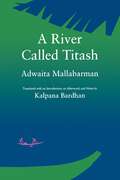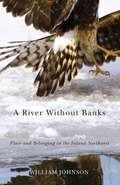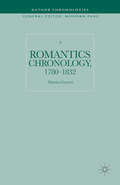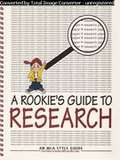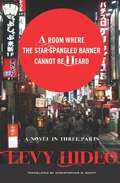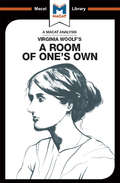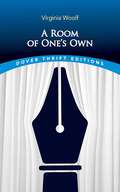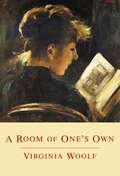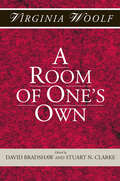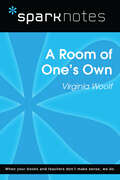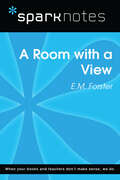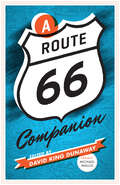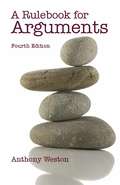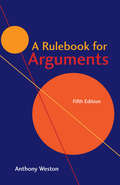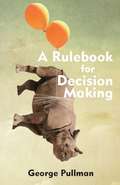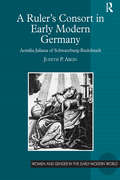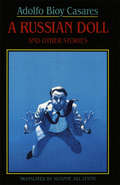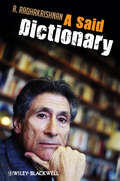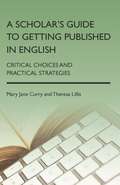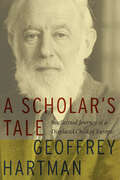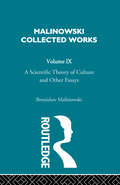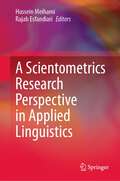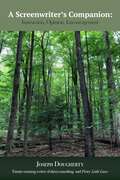- Table View
- List View
A River Called Titash (Voices from Asia #7)
by Adwaita MallabarmanOriginally published in 1956, A River Called Titash is among the most highly acclaimed novels in Bengali literature. A unique combination of folk poetry and ethnography, Adwaita Mallabarman's tale of a Malo fishing village at the turn of the century captures the songs, speech, rituals, and rhythms of a once self-sufficient community and culture swept away by natural catastrophe, modernization, and political conflict.Both historical document and work of art, this lyrical novel provides an intimate view of a community of Hindu fishers and Muslim peasants, coexisting peacefully before the violent partition of Bengal between India and East Pakistan (now Bangladesh). Mallabarman's story documents a way of life that has all but disappeared.
A River without Banks
by William JohnsonA River without Banks chronicles one family's journey to Idaho, with all of its uncertainties, promises, and hopes. The book explores their encounters with a place still partly wild, whose communities and landscapes teach them how to respect the earth and each other. William Johnson's essays move from a family vacation spent observing moose, to a comparison of the creation myths from Genesis and the Nez Perce, to watching a raptor seeking prey. Johnson meditates on how places, animals, and people teach us "how to see, and how we do, and don't, belong." In prose that reveals a poet's eye, Johnson examines how family relationships affect how we see the natural world. He explores the power of words to divide and to heal. He illuminates the challenges of sustaining a vital relationship with a home place. A River without Banks will appeal to readers interested in the literature of place, ecology, natural history, indigenous culture, and conservation.
A Romantics Chronology, 1780-1832 (Author Chronologies Series)
by Martin GarrettThis book covers the life and work of a wide range of writers from Coleridge to Wollstonecraft, Hemans, Beckford and their contemporaries. Also encompassing a wealth of material on contexts from the treason trials of 1794 to the coming of gas-light to the London stage in 1817, it provides a panorama of one of the richest periods in British culture.
A Rookie's Guide to Research: An MLA Style Guide (Third Edition)
by Barbara Mills Mary StilesMeant for the novice researcher-someone who has had little or no previous experience in research. It also intends to serve as an effective tool to refresh and reinforce previous learning.
A Room Where The Star-Spangled Banner Cannot Be Heard: A Novel in Three Parts
by Hideo LevySet against the political and social upheavals of the 1960s, A Room Where the Star-Spangled Banner Cannot Be Heard tells the story of Ben Isaac, a blond-haired, blue-eyed American youth living with his father at the American consulate in Yokohama. Chafing against his father's strict authority and the trappings of an America culture that has grown increasingly remote, Ben flees home to live with Ando, his Japanese friend. Refusing to speak English with Ben, Ando shows the young American the way to Shinjuku, the epicenter of Japan's countercultural movement and the closest Ben has ever felt to home.From the vantage point of a privileged and alienated "outsider" (gaijin), Levy's narrative, which echoes events in his own life, beautifully captures a heady, eventful moment in Japanese history. It also richly renders the universal struggle to grasp the full contours of one's identity. Wandering the streets of Shinjuku, Ben can barely decipher the signs around him or make sense of the sounds reaching his ears. Eventually, the symbols and sensations take root, and he becomes one with Japanese language and culture. Through his explorations, Ben breaks free from English and the constraints of being a gaijin. Levy's coming-of-age novel is an eloquent elegy to a lost time.
A Room for Moose: Buildup Unit 9 Lap Book (Buildup Ser.)
by Cindy Peattie Nicola Anderson Kate CochranNIMAC-sourced textbook
A Room of One's Own
by Fiona Robinson Tim Smith-LaingA Room of One's Own is a very clear example of how creative thinkers connect and present things in novel ways. Based on the text of a talk given by Virginia Woolf at an all-female Cambridge college, Room considers the subject of 'women and fiction.' Woolf’s approach is to ask why, in the early 20th century, literary history presented so few examples of canonically 'great' women writers. The common prejudices of the time suggested this was caused by (and proof of) women's creative and intellectual inferiority to men. Woolf argued instead that it was to do with a very simple fact: across the centuries, male-dominated society had systematically prevented women from having the educational opportunities, private spaces and economic independence to produce great art. At a time when 'art' was commonly considered to be a province of the mind that had no relation to economic circumstances, this was a novel proposal. More novel, though, was Woolf's manner of arguing and proving her contentions: through a fictional account of the limits placed on even the most privileged women in everyday existence. An impressive early example of cultural materialism, A Room of One's Own is an exemplary encapsulation of creative thinking.
A Room of One's Own (Dover Thrift Editions: Literary Collections)
by Virginia WoolfVirginia Woolf unveils the societal barriers faced by women and explores the crucial link between women's financial independence and creative freedom in this extraordinary collection of essays. Initially presented as lectures in 1928 at Newnham College and Girton College, the University of Cambridge's women's colleges, this seminal work argues for a literal and figurative space for women writers within a patriarchal literary tradition. Woolf's essays constitute a foundational feminist text, highlighting the historical marginalization of women, advocating for equality, and emphasizing the importance of women's contributions to literature and beyond. Essential reading for anyone interested in feminism, literature, and women's history, A Room of One's Own resonates profoundly in today's ongoing gender discussions.
A Room of One's Own (Penguin Classics)
by Virginia WoolfA Room of One's Own is an essay based on a series of lectures Virginia Woolf delivered at Cambridge University in 1928. The argument she makes in this pioneering work of feminism is that in order to excel as artists women writers require both a literal and a figurative space they can claim as their own.
A Room of One's Own (Shakespeare Head Press Edition of Virginia Woolf)
by Virginia WoolfA Room of One’s Own, is one of Virginia Woolf’s most influential works and is widely recognized for its extraordinary contribution to the women’s movement. This timely and important new edition adopts the complete text of the first British edition published in 1929. Features a comprehensive introduction detailing the process and composition of Woolf’s original essay and the evolution of its subsequent publication history The first comprehensive and authoritative edition of this foundational text of the feminist movement, and one of the most significant works in Woolf’s own canon The only volume based on comparisons of each of the British editions of A Room of One’s Own that appeared in Woolf’s lifetime Incorporates extensive explanatory notes which reveal the essay’s broader political, historical, social, and literary contexts Includes a comprehensive appendix highlighting variations between each of the British editions that appeared in Woolf’s lifetime and the first American edition; alterations from Woolf’s uncorrected proofs; and current editorial emendations incorporated in this new edition
A Room of One's Own (SparkNotes Literature Guide Series)
by SparkNotesA Room of One's Own (SparkNotes Literature Guide) by Virginia Woolf Making the reading experience fun! Created by Harvard students for students everywhere, SparkNotes is a new breed of study guide: smarter, better, faster. Geared to what today's students need to know, SparkNotes provides: *Chapter-by-chapter analysis *Explanations of key themes, motifs, and symbols *A review quiz and essay topicsLively and accessible, these guides are perfect for late-night studying and writing papers
A Room with a View (SparkNotes Literature Guide Series)
by SparkNotesA Room with a View (SparkNotes Literature Guide) by E. M. Forster Making the reading experience fun! Created by Harvard students for students everywhere, SparkNotes is a new breed of study guide: smarter, better, faster.Geared to what today's students need to know, SparkNotes provides:*Chapter-by-chapter analysis *Explanations of key themes, motifs, and symbols *A review quiz and essay topicsLively and accessible, these guides are perfect for late-night studying and writing papers
A Route 66 Companion
by David King DunawayA literary history of America&’s most storied highway, featuring work from Raymond Chandler, Joan Didion, John Steinback, Sylvia Plath, and more.Even before there was a road, there was a route. Buffalo trails, Indian paths, the old Santa Fe trace—all led across the Great Plains and the western mountains to the golden oasis of California. America&’s insatiable westering urge culminated in Route 66, the highway that ran from Chicago to Los Angeles. Opened in 1926, Route 66 became the quintessential American road. It offered the chance for freedom and a better life, whether you were down-and-out Okies fleeing the Dust Bowl in the 1930s or cool guys cruising in a Corvette in the 1960s. Even though the interstates long ago turned Route 66 into a by lane, it still draws travelers from around the world who long to experience the freedom of the open road.A Route 66 Companion gathers fiction, poetry, memoir, and oral history to present a literary historical portrait of America&’s most storied highway. From accounts of pioneering trips across the western plains to a sci-fi fantasy of traveling Route 66 in a rocket, here are stories that explore the mystique of the open road, told by master storytellers ranging from Washington Irving to Raymond Chandler, Joan Didion, Sylvia Plath, Leslie Marmon Silko, and John Steinbeck. Interspersed among them are reminiscences that, for the first time, honor the varied cultures—Native American, Mexican American, and African American, as well as Anglo—whose experiences run through the Route 66 story like the stripe down the highway. So put the top down, set the cruise control, and &“make that California trip&” with A Route 66 Companion.&“Route 66 has a long and interesting history, and Dunaway . . . has done a fantastic job selecting works of literature about &‘America&’s Main Street&’ to tell its dynamic story, supplemented by the editor&’s own invaluable commentary. . . . [An]all-around remarkable anthology.&” —Publishers Weekly&“A Route 66 Companion is a great read and should find its way to the hands of any armchair traveler or lover of the history of the American West.&” —Oral History Review
A Rulebook for Arguments
by Anthony WestonA Rulebook for Arguments is a succinct introduction to the art of writing and assessing arguments, organized around specific rules, each illustrated and explained soundly but briefly. This widely popular primer--translated into eight languages--remains the first choice in all disciplines for writers who seek straightforward guidance about how to assess arguments and how to cogently construct them.The fourth edition offers a revamped and more tightly focused approach to extended arguments, a new chapter on oral arguments, and updated examples and topics throughout.
A Rulebook for Arguments
by Anthony WestonFrom academic writing to personal and public discourse, the need for good arguments and better ways of arguing is greater than ever before. This timely fifth edition of A Rulebook for Arguments sharpens an already-classic text, adding updated examples and a new chapter on public debates that provides rules for the etiquette and ethics of sound public dialogue as well as clear and sound thinking in general.
A Rulebook for Decision Making
by George Pullman"Pullman offers his readers essential insights into how humans reason and make decisions. Both concise and far-reaching, his work teaches us how to challenge intuitive logic and examine the processes for deliberative reasoning. This text will prove foundational for students in their intellectual journey toward the development of real skills in critical thinking. By pointing to simple yet profound examples, Pullman's text is both readable and provocative as it challenges us to consider the very mechanisms by which we understand our own cognitive biases." --Bradley A. Hammer, Department of English and Comparative Literature, University of North Carolina, Chapel Hill
A Ruler’s Consort in Early Modern Germany: Aemilia Juliana of Schwarzburg-Rudolstadt (Women and Gender in the Early Modern World)
by Judith P. AikinThe wives of rulers in early modern Europe did far more than provide heirs for their principalities and adornment for their courts. In this study, Judith Aikin examines the exceptionally well-documented actions of one such woman, Aemilia Juliana of Schwarzburg-Rudolstadt (1637-1706), in order to expand our understanding of the role of ruler’s consort in the small principalities characteristic of Germany during this period. Aikin explores a wide range of writings by her subject, including informal letters to another woman, hundreds of devotional song texts, manuscript books both devotional and practical, and published pamphlets and books. Also important for this study are the plays, paintings, and musical works that adorned the court under Aemilia Juliana’s patronage; the books, poems, and sermons published in her honor; and the massive memorial volume printed and distributed soon after her death. This material, when coupled with the more scanty record in official documents, reveals the nature and scope of Aemilia Juliana’s role as full partner in the ruling couple. Among the most important findings based on this evidence are those related to Aemilia Juliana’s advocacy for women of all social classes through her authorship and publications, her support for the education of girls, her efforts to ameliorate the fear and suffering of pregnant and birthing women, and her contributions to female support networks. In examining the career of a consort whose various activities are so well documented, this study helps to fill in the blanks in the documentary record of numerous consorts across early modern Europe, and serves as a model for future research on other consorts at other courts.
A Ruler’s Consort in Early Modern Germany: Aemilia Juliana of Schwarzburg-Rudolstadt (Women and Gender in the Early Modern World)
by Judith P. AikinThe wives of rulers in early modern Europe did far more than provide heirs for their principalities and adornment for their courts. In this study, Judith Aikin examines the exceptionally well-documented actions of one such woman, Aemilia Juliana of Schwarzburg-Rudolstadt (1637-1706), in order to expand our understanding of the role of ruler’s consort in the small principalities characteristic of Germany during this period. Aikin explores a wide range of writings by her subject, including informal letters to another woman, hundreds of devotional song texts, manuscript books both devotional and practical, and published pamphlets and books. Also important for this study are the plays, paintings, and musical works that adorned the court under Aemilia Juliana’s patronage; the books, poems, and sermons published in her honor; and the massive memorial volume printed and distributed soon after her death. This material, when coupled with the more scanty record in official documents, reveals the nature and scope of Aemilia Juliana’s role as full partner in the ruling couple. Among the most important findings based on this evidence are those related to Aemilia Juliana’s advocacy for women of all social classes through her authorship and publications, her support for the education of girls, her efforts to ameliorate the fear and suffering of pregnant and birthing women, and her contributions to female support networks. In examining the career of a consort whose various activities are so well documented, this study helps to fill in the blanks in the documentary record of numerous consorts across early modern Europe, and serves as a model for future research on other consorts at other courts.
A Russian Doll & Other Stories
by Adolfo Bioy Casares Suzanne Jill LevineThis collection of traditional and experimental stories by Argentinian novelist Bioy Casares ( The Adventures of a Photographer in La Plata ) offers sophisticated, seamless prose, as well as magical realism and biting political satire. - Publishers Weekly A Russian Doll and Other Stories is the ninth collection of short fiction by one of this century's premier Argentinian writers who, with his fellow countrymen Julio Cortázar and Jorge Luis Borges, helped change the world's perception of Latin American literature. Bioy Casares's narratives are elegant and urbane, his style precise and streamlined, as he paces his characters through seriocomic traps of fate--ensnared by love, impelled by lust, ambition, or plain greed, even metamorphosed by pharmaceuticals. These are not stories in a psychological mode but like the image of the Russian doll of the title piece are carefully wrought congeries of intractable selves within selves.
A Said Dictionary
by R. RadhakrishnanThis interpretive dictionary introduces the critical and theoretical world of distinguished literary and cultural critic Edward W. Said through the crucial terms and concepts central to his work. Compares and contrasts Said's perspective with other key theorists, such as Derrida, Spivak, Foucault, and Jameson Describes the crucial terms and concepts central to Said's work Places the development of Said's work within its historical context
A Scholar's Guide to Getting Published in English
by Mary Jane Curry Theresa LillisIn many locations around the globe, scholars are coming under increasing pressure to publish in English in addition to other languages. However research has shown that proficiency in English is not always the key to success in English-medium publishing. This guide aims to help scholars explore the larger social practices, politics, networks and resources involved in academic publishing and to encourage scholars to consider how they wish to take part in these practices-as well as to engage in current debates about them. Based on 10 years of research in academic writing and publishing practices, this guide will be invaluable both to individuals looking for information and support in publishing, and to those working to support others' publishing activities.
A Scholar's Tale: Intellectual Journey of a Displaced Child of Europe
by Geoffrey HartmanFor more than fifty years, Geoffrey Hartman has been a pivotal figure in the humanities. In his first book, in 1954, he helped establish the study of Romanticism as key to the problems of modernity. Later, his writings were crucial to the explosive developments in literary theory in the late seventies, and he was a pioneer in Jewish studies, trauma studies, and studies of the Holocaust. At Yale, he was a founder of its Judaic Studies program, as well as of the first major video archive for Holocaust testimonies.Generations of students have benefited from Hartman’s generosity, his penetrating and incisive questioning, the wizardry of his close reading, and his sense that the work of a literary scholar, no less than that of an artist, is a creative act. All these qualities shine forth in this intellectual memoir, which will stand as his autobiography. Hartman describes his early education, uncanny sense of vocation, and development as a literary scholar and cultural critic. He looks back at how his career was influenced by his experience, at the age of nine, of being a refugee from Nazi Germany in the Kindertransport. He spent the next six years at school in England, where he developed his love of English literature and the English countryside, before leaving to join his mother in America.Hartman treats us to a “biobibliography” of his engagements with the major trends in literary criticism. He covers the exciting period at Yale handled so controversially by the media and gives us vivid portraits, in particular, of Harold Bloom, Paul de Man, and Jacques Derrida.All this is set in the context of his gradual self-awareness of what scholarship implies and how his personal displacements strengthened his calling to mediate between European and American literary cultures. Anyone looking for a rich, intelligible account of the last half-century of combative literary studies will want to read Geoffrey Hartman’s unapologetic scholar’s tale.
A Scientific Theory of Culture and Other Essays: [1944]
by Bronislaw MalinowskiPublished, posthumously, this volume is both a summing up and a reformulation of Malinowski's functional theory of culture.
A Scientometrics Research Perspective in Applied Linguistics
by Hussein Meihami Rajab EsfandiariThis volume explains how scientometrics can be used in understanding the research studies in applied linguistics and will assist applied linguists to examine different aspects of the research performed in their field. The book covers a diachronic and synchronic empirical analysis of research practices, concepts, and phenomena in applied linguistics. It builds upon the ideas and experience of international researchers and provides the reader with creative methods to apply the scientometric principles in their applied research. Aimed at emerging applied linguistics researchers, researcher-practitioners, and MA and PhD students, this book provides a wealth of research ideas for further analysis, to strengthen the knowledge of the field, and to help digest research practices, research publications, research trends, research policies, and research methods. The book will also be useful for the well-established applied linguistics researchers who is interested in a reconceptualization of the field.
A Screenwriter's Companion: Instruction, Opinion, Encouragement
by Joseph DoughertyEveryone wants to write for television, and now there's a book that teaches you how to do it by an author who has not only done it himself, but has won multiple awards in the process. &“I was a writer before I knew what a writer was.&” -Joseph DoughertyJoseph Dougherty has been a successful playwright and television writer, producer, and director for more than thirty years. He&’s written for breakthrough series that have changed the way we look at television drama, from thirtysomething to Pretty Little Liars, winning everything from Emmys to Teen Choice Awards along the way. In A Screenwriter&’s Companion,Dougherty offers insights and advice both practical and nonpractical to writers and would-be writers. Dougherty&’s voice comes off the page with anecdotes about the writing process, hard-learned tips for survival in &“the business,&” and reflections on the influences that led him to a successful career. Honestly, entertainingly, without cynicism, he gives readers permission to embrace the writer they want to be, so they can experience the rewards and satisfactions of writing. Beyond an insider&’s take on story and structure, dialogue, action and outlining, A Screenwriter&’s Companionis as much mentor as it is manual. With every insider observation about how to keep a potential producer reading till the last page of a script, there&’s encouragement to explore your thoughts and memories, things a writer needs to embrace in order to become more than &“a pro.&” In short, to see writing not as merely a career, but as a way to greater self-understanding. With a Foreword by Scott Ryan (thirtysomething at thirty: an oral history). This book was selected by Foreword Magazine as one of the Best Gift Items of Fall 2022.
